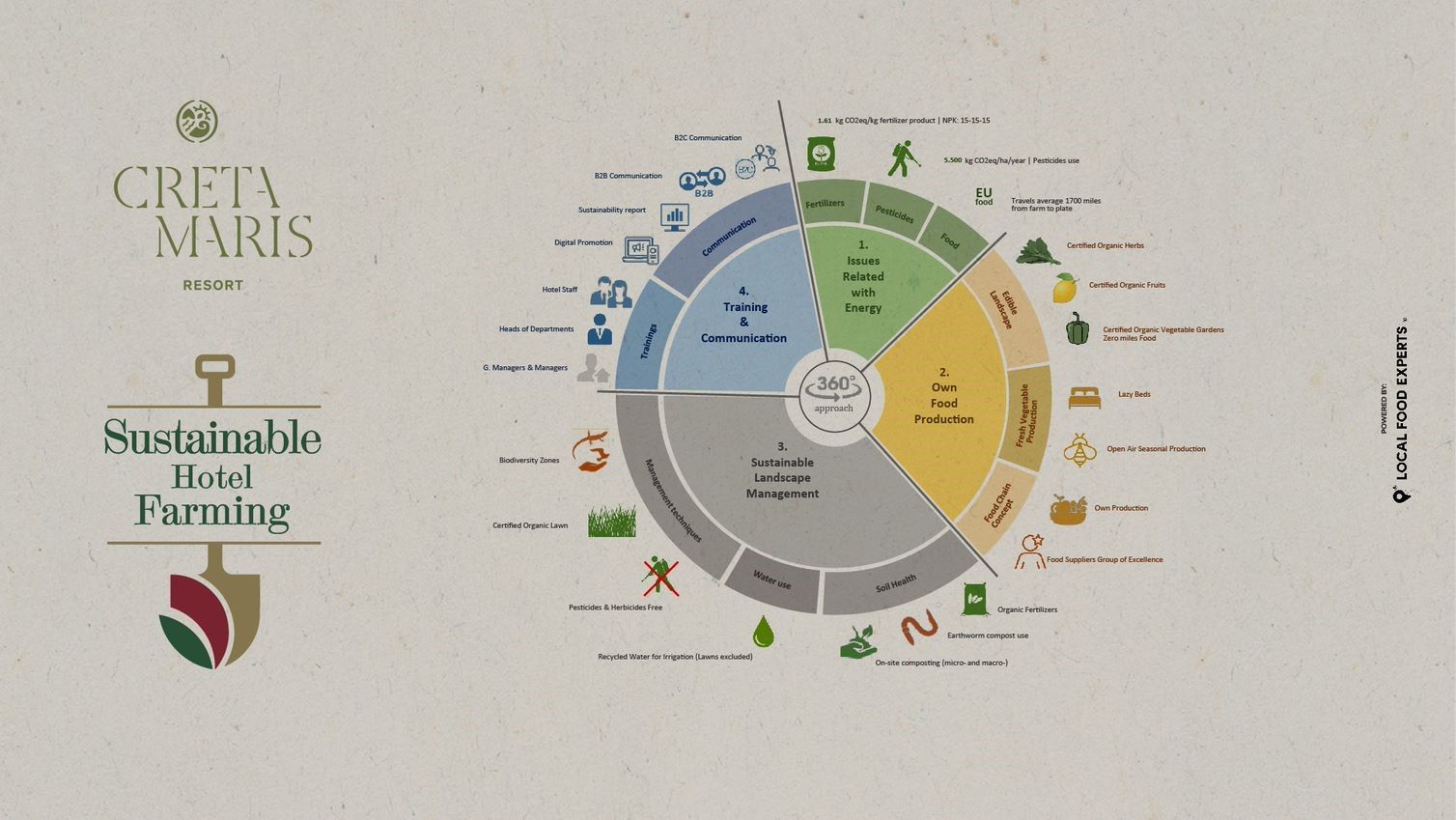Βέλτιστες Πρακτικές
Αξιοσημείωτες είναι οι πρακτικές διαχείρισης πλαστικών απορριμμάτων της Creta Maris. Υπάρχει ένα σύστημα συλλογής απορριμμάτων σε όλη τη μονάδα, το οποίο διαχωρίζει τα πλαστικά σε ειδικούς κάδους στο σημείο προέλευσής τους. Μόλις συλλεχθούν, τα εξερχόμενα πλαστικά ζυγίζονται για παρακολούθηση της παραγωγής απορριμμάτων στην αποθήκη του ξενοδοχείου πριν σταλούν για ανακύκλωση. Η Creta Maris δεσμεύεται να αντιμετωπίσει και τη σπατάλη τροφίμων. Υιοθετείται μια πολύπλευρη προσέγγιση για τη μείωση της σπατάλης τροφίμων, με στενή παρακολούθηση της μάζας των απορριμμάτων τροφίμων, τα μεγέθη μερίδων προσαρμόστηκαν και εφαρμόστηκαν καλύτερες στρατηγικές παρουσίασης των τροφίμων. Επιπλέον, το προσωπικό εκπαιδεύτηκε για τη μείωση της σπατάλης τροφίμων, ενώ οι επισκέπτες και οι εργαζόμενοι ενημερώθηκαν για αυτές τις προσπάθειες.
Από το 2013, το Creta Maris Resort εφαρμόζει με επιτυχία μεθόδους κυκλικής οικονομίας για να γίνει πιο περιβαλλοντικά βιώσιμο. Η διοίκηση της μονάδας έχει αναπτύξει «έναν εξατομικευμένο οδηγό για την οικοδόμηση και την εφαρμογή της Βιώσιμης Διακυβέρνησης με μια «σκέψη σε παγκόσμιο επίπεδο» - «τοπική νοοτροπία και έναν ορίζοντα 2030». Αυτό το μοντέλο αποτελείται από 4 ενότητες (Βιώσιμη Επιτροπή – Στρατηγικές Προτεραιότητες – Βιώσιμες Προμήθειες – Ανακοίνωση Επιτευγμάτων) που καθοδηγούν μεμονωμένες ενέργειες που περιλαμβάνουν ευθυγράμμιση πολιτικής, υιοθέτηση πρακτικών, υπεύθυνη προμήθεια και διάδοση του θετικού αντίκτυπου.
Οι προκλήσεις σχετίζονται με τη διαχείριση αλλαγών και την απόδοση επένδυσης (ROI) των βιώσιμων επενδύσεων. Καθώς υπάρχει συγκεκριμένο παράθυρο πιθανής υλοποίησης για παρέμβαση στους χώρους του θερέτρου (εκτός εποχής), χρειάζεται προσεκτικός σχεδιασμός. Η αρχική επένδυση πρέπει να κεφαλαιοποιηθεί πολύ βραχυπρόθεσμα, μεταφέροντας την προστιθέμενη αξία των περιβαλλοντικά ευαίσθητων πρακτικών πρώτα στη μάρκα και μετά στην πραγματική εμπειρία των επισκεπτών. Μια ευρύτερη πρόκληση είναι η αντιληπτή προστιθέμενη αξία των περιβαλλοντικά βιώσιμων πρακτικών για θέρετρα all inclusive από τους επισκέπτες τους, καθώς η σηματοδότηση αρετής από μόνη της δεν μπορεί να αυξήσει τη ζήτηση, αλλά πραγματικές θετικές εμπειρίες.
Η στρατηγική αειφόρου ανάπτυξης που εφαρμόζει η Creta Maris μπορεί να προσαρμοστεί στις ιδιαιτερότητες άλλων τουριστικών μονάδων, επιτρέποντάς τους να διαχειρίζονται τη χρήση ενέργειας, τα απόβλητα, την προμήθεια τροφίμων και το συνολικό περιβαλλοντικό αποτύπωμα της λειτουργίας τους με περιβαλλοντικά υπεύθυνο τρόπο. Οι μονάδες που υιοθετούν παρόμοιες στρατηγικές ωφελούν τόσο το εμπορικό σήμα τους, το οποίο ενσωματώνει αξίες περιβαλλοντικής ευθύνης, όσο και την εμπειρία που προσφέρεται στους επισκέπτες.
Οργανισμός



